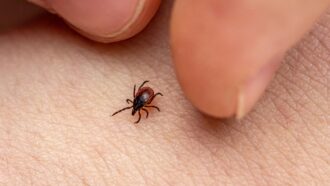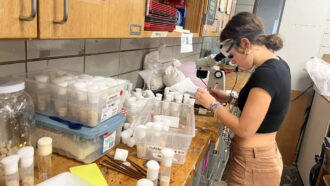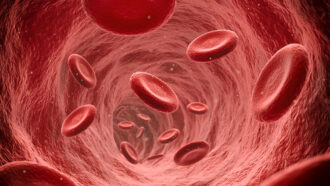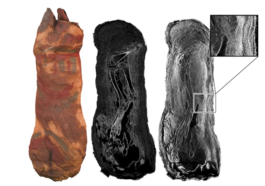Humans

Educators and Parents, Sign Up for The Cheat Sheet
Weekly updates to help you use Science News Explores in the learning environment
Thank you for signing up!
There was a problem signing you up.
-
 Health & Medicine
Health & MedicineCough! What happens when something goes down the wrong way
Certain cells can sense water and acid on the way to the lungs, prompting reactions such as coughing and swallowing, research in mice shows.
-
 Health & Medicine
Health & MedicineScientists Say: Menstruation
Menstruation is part of a roughly monthly cycle that helps a person’s body prepare for possible pregnancy.
-
 Health & Medicine
Health & MedicineNew tool maps where U.S. heat can pose threats to your health
The daily updated HeatRisk maps use color coding to show where the health threat from heat is highest. The website also offers tips for staying safe.
By Nikk Ogasa -
 Humans
HumansCommon high-school textbooks promote unscientific views on gender
Inaccurate descriptions of sex and gender may lead to sexism or prejudice toward people who don’t seem to represent gender norms.
By Laura Allen -
 Health & Medicine
Health & MedicineHow to help transgender and nonbinary teens bloom during puberty
Gender-affirming medical care during puberty can help transgender and nonbinary teens end up with an adult body that matches their gender.
By Laura Allen -
 Genetics
GeneticsA protein in sweat may protect people from Lyme disease
That protein stopped the disease-causing bacterium from growing in lab dishes or infecting mice.
-
 Tech
TechBioelectronics research wins top award at 2024 Regeneron ISEF
Three grand-award winners each took home at least $50,000. Hundreds more teens shared more than $9 million in prizes at the international competition.
-
 Brain
BrainHerbal medicine could help recovery after concussion
A finalist at Regeneron ISEF found that a plant native to China could supplement a common pain reliever that comes with unwanted side effects.
-
 Physics
PhysicsThe movie Frozen inspired the icy, 3-D printing of blood vessels
Ice guides a 3-D printing method to make realistic, artificial blood vessels. One day, such vessels could be used in lab-grown organs.
By Sarah Wells -
 Chemistry
ChemistryHere’s why teens’ body odor can be especially strong
The body odors of teens and younger kids share dozens of chemicals in common. But teens have some that infants and toddlers appear to lack.
By Skyler Ware -
 Artificial Intelligence
Artificial IntelligenceArtificial intelligence is making it hard to tell truth from fiction
Experts worry that by making it harder to tell what’s true, AI can threaten people’s reputations, health, fair elections and more.
-
 Physics
PhysicsLet’s learn about particles that help us peer inside objects
Particles such as muons, X-rays and neutrons help scientists peer inside fossils, mummies, pyramids, volcanoes and the human body.